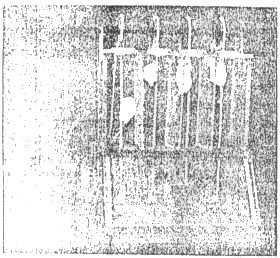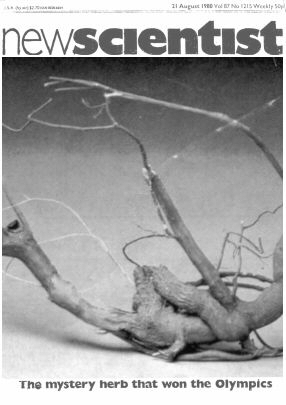
The Russians went on to find several more antifatigue substances, such as the plants Aralia manshurica, Acantopanax sessiliflorum and Rhodiola rosea. Pantocrine from young deer antlers, and schizandra berries. In most cases glycosides turned out to be the main effective substances, a finding confirmed by the Japanese in their studies of Oriental tonic remedies. Invariably the glycosides, which turn up, have never previously been regarded as having any importance medicinally and they have been regarded as having any importance medicinally and they have been generally ignored in pharmacology.
Research first focused on the relationship between these substances and classical stimulants such as amphetamine or caffeine. In both human and animal task performance trials, Eleutherococcus and ginseng improved the ability to solve problems, to concentrate and to be accurate as well as fast; and the more tired and weary the individual, the stronger the effect. At reasonable doses these materials did not produce excitation, jitteriness or insomnia. Stimulants on the other hand reduce all-round performance and problem solving, while increasing speed, and they have a well-known catalogue of side effects. Biochemically too, the glycosides act differently from the stimulants. For example the psychophysical effects of Eleutherococcus were found to depend absolutely on the manufacture of protein in the brain; the effects of amphetamine were independent.
If this is the case, to which pharmacological category can we assign the glycosides? The clue came when the Soviets subjected laboratory animals to other stresses besides exhaustion, such as freezing or baking temperatures, altered atmospheric pressure and oxygen content, immobilization, radiation, toxic drugs and chemicals, or disease including cancer and malaria. The animals were much more likely to survive after being given ginseng, Eleutherococcus and similar substances. In one experiment, the lifetime of rats after receiving 3000 rats of gamma radiation was doubled; stimulants mostly reduce the chances of survival. Clearly these materials have a much wider effect on body resistance than tolerance to exhaustion alone. Indeed, in retrospect one could see that the previous experiments on arousal and conditioned behavior all had one thing in common - the organism was in stress, and the greater the stress the stronger the effect hat the glycosides produced.

"Eleutherococccus could swinming time by up to 44 percent a similar increase was found in trials with a moving *** *** which mice are forced to run by electric shocks"
At this point one has to tread carefully. Are there really l rugs, which can make you more resistant than you already ire? This would be an astonishing and heretical claim if it were true, for it implies that there are drugs in existence hat actually increase health rather than cure disease, which is mind you, what is claimed for these drugs in oriental medicine. Or is it all a case of an illusion of unprecedented dimensions with the hundreds of millions of Russians and Orientals taking useless remedies and becoming invigorated by belief alone? I doubt it. It is true hat some look askance at Soviet medical research. The host of Lysenko still walks abroad. Yet the hundreds of rapers on Eleutherococcus and the thousands on ginseng have an internal consistency. The Soviet scientific bear has opt its teeth into the problem and is worrying out the answers. Research on Eleutherococcus is only now beginning to be repeated outside the USSR - but pioneering Soviet research on ginseng has been amply borne out in many research centers throughout the world and confirmed my own studies.
Moreover it is possible to put forward a scheme concerning their action as drugs which brings together much of the science, explains their traditional uses, and shows why the West has had such a hard time accepting their electiveness. The scheme starts with stress. The stress assistance of the body is controlled by a primary, instantaneous “hot line” of the sympathetic nervous system and its chemical alarm, adrenaline, and secondarily by a longer alarm backup system organized by a range of steroid hormones secreted by the adrenal cortex. These mobilize offences by shifting blood to the muscles, increasing, the apply of detoxification and other protective chemicals from the liver, improving the supply of energy compounds, exerting the brain and so on. The stress response is a two aged sword. It meets challenges, but at a cost. States of instant stress or anxiety can ruin health and cause psychosomatic and degenerative disease. Survival and health result not so much from an abundance of stress hormone, as sparing and efficient usage.
Now when the Russians dissected their severely stressed imals, they fund that the classical signs of overuse of a stress steroids - damaged stomach, enlarged spleen and thymus - were largely absent from the Eleutherococcus treated animals. They found that injecting Eleutherococcus or ginseng before stress helped the body deal with the stress more efficiently. Less stress hormone was secreted and the adrenal glands had greater hormone manufacturing capacity. This has been confirmed and extended by several laboratories in the Far East, and also at the University of California at Los Angeles, Ginseng appears to have little effect in the absence of stress but when stress occurs, it encourages a faster response of stress hormone and a more rapid return to normality.
This led to the general assumption that the glycosides act primarily on the adrenal glands. However, I believe this is unlikely for several reasons. First, the adrenal glands are controlled from above, from the hypothalamus that sends are controlled from above, from the hypothalamus that sends a cascade of instructions via the pituitary to control the milieu interieur; the central component of this cascade is adreno-corticotrophic hormone, or ACTH. Secondly, the earliest reported effect of ginseng is a rise after injection of ginseng glycosides. Thirdly, some effects such as those on behavior occur even when the adrenals are removed. Finally, we found at Chelsea College that when rats which have had their adrenal glands removed are given a course of ginseng glycosides, there is removed are given a course of ginseng glycosides, there is a large increase in the binding of corticosteroid stress hormone to their brain cells in the lower brain.
